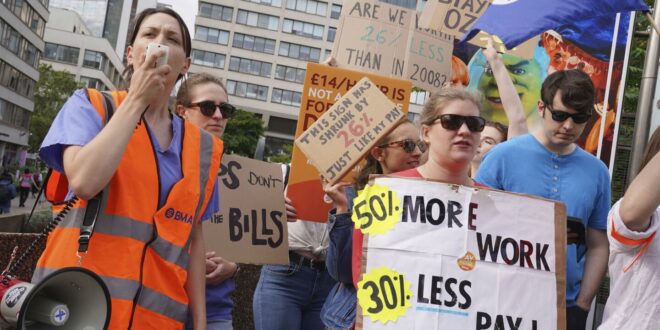Thousands of Junior Doctors in England Launch Five-Day Strike Over Pay
Britain’s state-funded health care service is currently facing its longest-ever strike as tens of thousands of junior doctors in England walked out of their jobs on Thursday. These doctors, who are in the early stages of their careers in the National Health Service (NHS), initiated the strike to protest against their pay. Picket lines were formed outside hospitals across England, where the young doctors called for a 35% pay rise.
The British Medical Association (BMA), the doctors’ union, is advocating for this pay increase in order to bring the junior doctors’ pay back to 2008 levels, accounting for inflation. The workload for these doctors has also significantly increased due to the high number of patients awaiting treatment following the COVID-19 pandemic.
Meanwhile, in Hollywood, unionized actors were on the verge of going on strike but agreed to federal mediators intervening at the last minute. In Southern California, workers who picketed 19 major hotels during the recent holiday weekend have returned to their jobs, but their union warned that further walkouts could occur at any time. The hotel workers demand higher pay and better benefits, criticizing their current compensation.
Dr Robert Laurenson and Dr Vivek Trivedi, leaders of the BMA, expressed their concern regarding the government’s stance on not negotiating during strikes. They urged the British government, responsible for health policy in England, to reconsider this position. However, the government remains firm, asserting that negotiations will not take place during ongoing strikes.
Health Secretary Steve Barclay emphasized the potential impact this five-day strike by junior doctors could have on patient safety and efforts to reduce NHS waiting lists. He argued that a pay rise of 35% or more is unreasonable and could fuel inflation, resulting in a deteriorating financial situation for everyone.
The doctors’ strike is expected to cause significant disruption to the already struggling NHS, with operations and consultations being postponed or canceled. Dr Simon Steddon, chief medical officer at Guy’s and St Thomas’s hospital trust in south London, appealed to both sides to resume negotiations, expressing concerns over the repercussions for patients. He revealed that previous strikes had already led to the cancellation or rescheduling of 55,000 appointments and nearly 6,000 planned procedures at the hospitals he oversees.
One striking doctor, Alex Gibbs, emphasized that the walkout was not a cause for celebration but a culmination of years of declining pay and deteriorating conditions. The doctors claim to have no other choice but to take drastic action because of their circumstances.
 Mind Uncharted Explore. Discover. Learn.
Mind Uncharted Explore. Discover. Learn.


